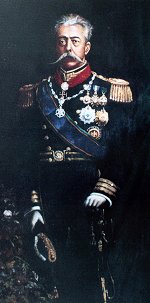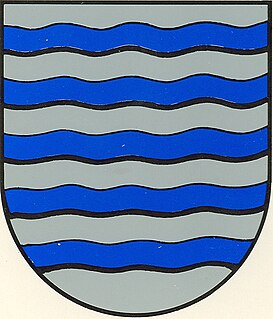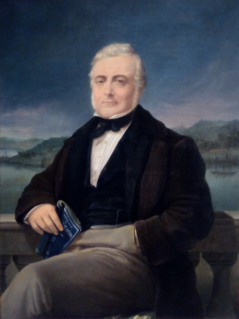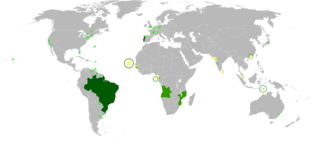
Count of Cantanhede was a Portuguese title of nobility created by a royal decree, dated from 6 August 1479, by King Afonso V of Portugal, and granted to D. Pedro de Menezes, 5th Lord of Cantanhede.

The title duke of Terceira, de juro e herdade was created by decree of King Pedro IV of Portugal, on 8 November 1832. António José de Souza Manoel de Menezes Severim de Noronha, 7th Count of Vila Flor, de juro e herdade, and 1st Marquis of Vila Flor, was the first holder of the title.

Duke of Lafões was a Portuguese title of nobility created under the decree of February 17, 1718, of King John V of Portugal and granted to his nephew, Dom Pedro Henrique de Bragança, son of the Infante Miguel de Bragança, an illegitimate son of King Peter II of Portugal and Anne Armande Pastre de Verger, though Pedro's mother, Luisa Casimira de Sousa Nassau e Ligne was the first to use this title.The title was later passed on to his brother, João Carlos de Bragança e Ligne de Sousa Tavares Mascarenhas da Silva, the most famous Duke of this title.
Hugo Ricciardi O'Neill, 6th Viscount of Santa Mónica is the current head of a branch of the O'Neill dynasty of Clanaboy, whose family has been in Portugal since the 18th century.
Carlos O'Neill, was the titular head of a branch of the Clanaboy O'Neill dynasty, whose family has been based in Portugal since the 18th century.
Viscount of São Jorge is a title was created by Carlos I of Portugal, by decree dated 7 November 1893, in the name of Adriano Auguto d´Oliveira, Knight of the Royal Household, Knight Commander of the Royal Military Order of Our Lady of Conception of Vila Viçosa. Adriano Auguto d´Oliveira married Eleanor Justine du Puy de Montbrun, daughter of the Marquess Lucien de Montbrun and the Marchioness Louise Amelie Marie Soulages de Saint-Marc. He lived in Paris and died in the same city without surviving descendants.
Viscount of Banho is an hereditary title created by Queen Maria II of Portugal, by decree on 21 July 1835, in favour of Alexandre Tomás de Morais Sarmento, at the same time that his brother was made 1st Baron and 1st Viscount of Torre de Moncorvo, of Tomás Inácio de Morais Sarmento.
Baron of São Cosme was a title in the Portuguese nobility created on 12 May 1835 by Queen Maria II of Portugal. The first holder was João Nepomuceno de Macedo, born in Chamusca, brigadier general of the liberal constitutionalist army during the Liberal Wars, Knight Commander of the Order of Aviz and of the Order of the Tower and Sword.
The Viscount of Torre de Moncorvo is a title created by Queen Maria II of Portugal as a barony by decree dated 23 May 1835 in favour of Cristovão Pedro de Morais Sarmento, natural son, legitimated at the same time as his brother, the Viscount of Banho, of Tomás Inácio de Morais Sarmento.
Viscount of Vilarinho de São Romão is a title created by Queen Maria II of Portugal, by decree dated 17 September 1835, in favour of António Lobo Barbosa Teixeira Ferreira Girão (Sabrosa, Vilarinho de São Romão, 5 November 1785 - Lisbon, 17 March 1863], Member of the House of Lords, without descendents.

Carlos Eugénio Corrêa da Silva, 1st Viscount and 1st Count of Paço de Arcos, was a Portuguese statesman.

DomJoão Afonso da Costa de Sousa de Macedo was the 2nd Count of Mesquitela and 1st Duke of Albuquerque. Born and died in Lisbon, he was son of Luís da Costa de Sousa de Macedo e Albuquerque, the 1st Count of Mesquitela and Maria Inácia de Saldanha Oliveira e Daun, from the family of Marquis of Pombal.

Count of Viana was a Portuguese title of nobility granted to D. João Afonso Telo, 4th Count of Barcelos and direct cousin of Queen Leonor Teles, by King Ferdinand I of Portugal pursuant to a royal decree dated 13 March 1373.

Count of Alvor was a Portuguese title of nobility granted by king Peter II of Portugal on 4 February 1683, to Francisco de Távora, second son of António Luís de Távora, 2nd Count of São João da Pesqueira.
João Maria Barreto Ferreira do Amaral, 2nd Baron of Oliveira Lima, OC was a Portuguese nobleman.

Pedro Manuel Brito da Silva Girão, is a Portuguese engineer, professor, and researcher whose main interest is metrology.

Baron of Alagoa was a noble title created by D. Maria II by decree on 22 December 1841 in favour of José Francisco da Terra Brum, a wealthy merchant from the city of Horta, in the Portuguese archipelago of the Açores. The landowner had his residence along the margins of the Ribeira da Conceição, and included properties in the so-named coastal shoreline of Alagoa.
The Baron of Serra da Estrela was a noble title created by decree of King John VI on 5 February 1818, in favor Gracia Eça Telles de Abreu.
The Count of Barca is a noble title, created by Queen Maria I of Portugal, by decree dated 27 December 1815, in favour of António de Araújo e Azevedo.

Manuel da Silva Passos was a Portuguese jurist and politician, one of the most notable personalities of 19th-century Portuguese Liberalism. He is more commonly referred to as Passos Manuel, due to the way he was addressed in Parliament, where members were announced by their surname — "Manuel" being apposed to his surname in order to distinguish him from his brother, José da Silva Passos, who was also a member of Parliament.












